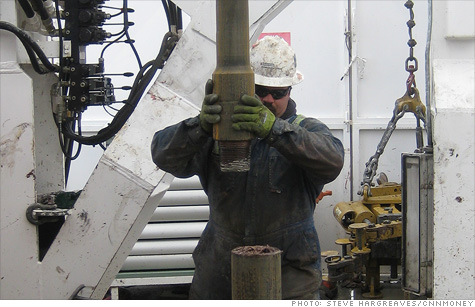Search News

Oil industry says it could deliver 1.4 million new jobs if allowed to drill off the East and West Coasts, off Florida's Gulf Coast and in Alaska's Arctic National Wildlife Refuge.
NEW YORK (CNNMoney) -- With job creation taking center stage in American politics, the oil industry Wednesday made a pitch for drilling more widely. With looser restrictions, the industry says it could deliver 1.4 million new jobs, boost tax rolls by $800 billion, and increase domestic energy production almost 50%.
To hit those numbers, the industry would need to drill off the East and West Coasts, in waters off Florida's Gulf Coast, in Alaska's Arctic National Wildlife Refuge, and on most federal public land that's not a national park. These areas are currently off limits to drilling, except for some public land in these regions.
In addition, the industry says it would need approval to build new pipelines to facilitate a doubling of production from Canada's vast oil sands, a halt to the gradual tightening of rules governing shale gas development, and the preservation of favorable tax policies the industry currently enjoys.
"Poll after poll shows that job creation is the top concern of most Americans," American Petroleum Institute President Jack Gerard said in a letter to President Obama. "We provide more than energy; we offer real-world solutions that will create jobs, strengthen our energy security and generate significant government revenue without raising taxes."
The industry has long sought more places to drill and less regulation, and it's hoping this latest report will find a receptive ear among lawmakers struggling with a sputtering economy.
But standing in the way is a long line of competing interests.
Those interests include Judi Whittaker, who runs a 500-cow dairy farm in upstate New York right atop the Marcellus Shale.
New York has been the scene of a bitter fight between supporters and opponents of shale gas development. The development relies on a controversial practice called hydraulic fracturing, or "fracking" for short, where vast amounts of water, sand and some chemicals are injected deep into the earth to unlock the gas.
The industry says the process is safe, but other are concerned over its effects on the water supply. New York has until recently banned the practice, but recently said it would allow it under tight new regulations.
Whittaker supports increased gas drilling on and near her farm, but she wants it done with the kind of regulations recently proposed by New York's Department of Environmental Conservation.
"We depend on clean water for our animals to drink," she said. "We produce milk, and it goes to the general public."
But the industry says that to boost jobs and production, it can't be restricted by what the report calls "unduly burdensome" shale gas regulations.
In July, the API said New York's regulation proposal "falls short" and that a "more effective balance is necessary to be sure [the state] is not just paying lip service on an issue that could create thousands of American jobs and billions of dollars in government revenue."
The API represents big oil companies like ExxonMobil (XOM, Fortune 500), Royal Dutch Shell (RDSA), BP (BP), Chevron (CVX, Fortune 500) and ConocoPhillips (COP, Fortune 500).
The industry will face opposition on other fronts as well.
Environmentalists have been getting themselves arrested on the White House lawn for the last several weeks, protesting the planned expansion of a pipeline from Canada's oil sands region to the U.S. Gulf Coast.
They are concerned that extracting crude from the oil sands, which have a higher carbon content than regular oil, will exacerbate global warming.
Florida's tourism industry, which supports nearly one million jobs in that state, also looks askew at industry attempts to drill off its coast, especially after the BP disaster last year.
"The Florida Association of Convention and Visitors Bureaus is against opening Florida waters in the Gulf of Mexico to drilling," said Robert Skrob, the association's director. "Employees and employers throughout Florida were negatively impacted by the Deepwater Horizon Oil Spill even though there was little direct impact to the state."
More oil no matter what: Even if the industry doesn't get its way, and regulations tighten and development slows, the report forecasts a growth in oil production.
Domestic oil production is expected to go from 7.8 million barrels a day in 2010 to 9 million barrels a day in 2030, according to the study, which was authored by energy consultants Wood Mackenzie. The gains are largely due to increased production from shale oil and deepwater drilling.
That's a significant jump, but it's not nearly the bounty predicted if the country grants the industry's wishes.
Under that scenario, the country could be producing 15.4 million barrels of oil a day -- not far from the 19 million barrels it currently consumes.
Natural gas production would rise by 30%.
It'll be up to politicians - and ultimately voters -- to decide if it's worth it. ![]()
| Overnight Avg Rate | Latest | Change | Last Week |
|---|---|---|---|
| 30 yr fixed | 3.80% | 3.88% | |
| 15 yr fixed | 3.20% | 3.23% | |
| 5/1 ARM | 3.84% | 3.88% | |
| 30 yr refi | 3.82% | 3.93% | |
| 15 yr refi | 3.20% | 3.23% |
Today's featured rates:
| Latest Report | Next Update |
|---|---|
| Home prices | Aug 28 |
| Consumer confidence | Aug 28 |
| GDP | Aug 29 |
| Manufacturing (ISM) | Sept 4 |
| Jobs | Sept 7 |
| Inflation (CPI) | Sept 14 |
| Retail sales | Sept 14 |